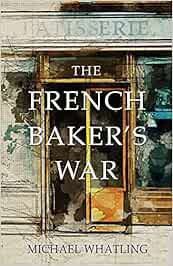3.5 Stars
The novel is set in occupied France between October 19 and December 5 of 1943. André Albert, a pastry chef, returns home from shopping to find his young son Frédéric playing in the street with no sign of his mother Mireille. Hiding inside the pâtisserie is Émilie, a young Jewish woman. André, desperate to find his wife, is willing to do anything to find her and bring her home, though his search often leads him into danger, as does his decision to shelter Émilie. Though Émilie helps to look after Frédéric, she is reticent to speak about her past, and it soon becomes obvious that she is keeping secrets from André.
The book’s focus is not on wartime battles but on the difficult choices people face during wartime. Much of the conflict is internal; more than one character faces choices which are “cliffs with only rocks below.” How can André get information about Mireille without drawing dangerous attention to himself? Does he have a moral duty to help Émilie, a stranger, even though helping her endangers him, his son, and the entire neighbourhood? Does a person have an obligation to speak up and defend a friend or reveal a truth if doing so puts one’s life in jeopardy?
What the book also shows is the ways war transforms people. Neighbours turn on neighbours or do nothing to help. A man may rail against those who choose silence and lack the will to help others but, later, faced with “not only an obligation to his friends, but a moral duty, as well” finds that his own “resolve is fragile as a bird’s wing.” One woman, because of her traumatic experiences, “resigns herself to endure life like it’s an affliction, anticipating nothing more than the bittersweet comfort of memories.” Another woman cannot see to be forgiven, “Not after what she’s had to do – what she’s been made to do. What she did to others.”
A strong element is the complex characterization. André, faced with the unexplainable absence of his wife, experiences a wide spectrum of emotions. He’s confused and “imagines scenarios where Mireille could leave them, willingly or not.” He’s hopeful that he can find out what happened to her and bring her home, but as time passes, he gives in to despair. Certain actions he takes the reader may find difficult to approve, but given the circumstances, they are realistic.
There are some events which I found problematic. At one point André leaves Frédéric entirely alone in the house when he goes to the church? A person would be accepted as a member of a Resistance cell without any real hesitancy? A man tells some Resistance fighters about a munitions factory as if it is news when it would probably have been common knowledge because a location with guards around its perimeter would surely have caught people’s attention? Monsieur Durant gives money to Émilie without asking why she needs it? On a Tuesday, André is supposed to be going to work, but he just doesn’t show up because he has a plan to follow someone, and there are no consequences to his truancy? André decides not to go to a friend to apologize after an argument because “Already too much time has passed” when the argument took place only the previous evening?
There is an aspect of style which bothered me. Though the author is obviously trying not to use clichéd comparisons, some of the similes and metaphors are awkward. Some examples: “A burst of their laughter skims across the water, taunting as the key to a dungeon cell dangling just out of reach.” And “Her stomach heaves like she’s swallowed one of those squalls that come out of nowhere to capsize everything in its path.” And “he’s lost somewhere under the surface of an ice-covered lake. Whatever took place seems distant to him as the planets.” And “Memories . . . she’d thought forgotten, return like an executioner to his duty after pausing to sharpen his axe.” And “What started as a pebble in a shoe, soon will be the size of a rock under the surface of a calm sea waiting to cause shipwrecks.” (As a former English teacher, I couldn't help but notice the incorrect punctuation in these last two examples.)
Some of the comparisons are meant to fit the thoughts of a particular individual, but I still found them stilted. A seamstress, for instance, has difficulty broaching a topic in conversation and so thinks, “It would be easier to fit a wedding dress on a spider”? André, the pastry chef, “eases into sleep again like he’s being lowered into a cave black as a Périgord truffle” and “scrutinizes each face with the meticulousness of making a dozen identical entremets” and compares his tension and excitement to “what Cordon Bleu chefs feel before meal service”?
Though not flawless, the book has much to offer. It excels in its depiction of characters faced with very difficult choices. And there are some surprising twists which the reader will not see coming but which are appropriate.
Thank you to the author, Michael Whatling, for a print copy of the book.

No comments:
Post a Comment